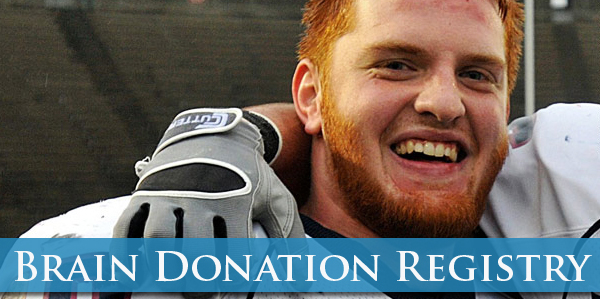CTE Brain Donation Registry
The CTE Brain Donation Registry was established in 2008 to advance research on the effects of trauma on the brain and spinal cord. The CTE Brain Donation Registry allows current and former athletes and military personnel, who meet a criteria for exposure, to pledge to donate their brain and spinal cord to the VA-BU-SLI Brain Bank after death. The identity of donors is confidential and protected by both IRB rules and HIPAA laws.
Frequently Asked Questions:
Why is brain tissue donation important?
The purpose of the research is to help understand the long-term effects of previous brain injuries, including any association with Chronic Traumatic Encephalopathy (CTE). This donation process is an opportunity for individuals to help further research and help protect future generations. Participation will help researchers to better understand CTE, including its neuropathology, clinical presentation and course, and environmental and genetic risk factors.
Who can give consent for brain tissue donation?
The legally authorized representative (usually, the next-of-kin) may give consent to donate brain and spinal cord tissue following the death of a donor.
Who handles organizing the tissue donation?
A full-time brain donation coordinator is available 24/7, 365 days per year to arrange the tissue harvesting by a local diener near the locality where the donor has died. All costs for the extraction are paid by the VA-BU-SLI Brain Bank. The donation process is a time sensitive matter; please call the BU CTE Center 24/7 voicemail/pager at 617-992-0615.
Is there any cost associated with this study?
There are no costs to for participating in this research study. The study will pay for all expenses involved with brain and spinal cord donation. Please note that funeral expenses remain the responsibility of the loved ones.
What is the role of the next-of-kin in the donation process?
The next-of-kin is required to complete consent forms authorizing brain, spinal cord, CSF and/or plasma donation. These will be faxed or emailed by the brain donation coordinator. Once, completed the donor’s next-of-kin is required to fax and/or emailed the signed consents back to the brain donation coordinator. One copy is retained by the VA-BU-SLI Brain Bank, and another copy is faxed to the local diener.
What happens to the body?
The autopsy procedure does not interfere with the events associated with the funeral. No disfigurement occurs as a result of this procedure. The family can plan an open casket or other traditional funeral arrangements and the donation process will be undetectable. In addition, we will do our best not to interfere with any arrangements the family might have.
What is the role of family members after a donation has been made?
One important goal of the research is to better understand the clinical presentations of CTE. In order to do this, we try to gather as much relevant information about our donors during their life as possible. Family members participate in clinicians gathering this information.
For additional information on how to participate in the CTE Brain Donation Registry, contact:
Patrick Kiernan
Research Assistant
Phone: 617-414-1187
Email: pkiernan@bu.edu
For urgent brain donation matters, please call the BU CTE Center 24/7 voicemail/pager at 617-992-0615.

